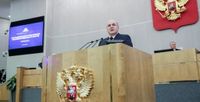On March 26, 2025, Russian Prime Minister Mikhail Mishustin addressed the State Duma, identifying intermediaries as a significant factor behind the rising food prices in the country. Mishustin emphasized that the costs associated with packaging and delivering goods should remain within reasonable limits, stating, "Services for packaging and delivering goods should not go beyond reasonable limits." He highlighted the troubling findings from the Federal Antimonopoly Service (FAS), which revealed that in some instances, such as with fish products, profit margins can reach up to 50%. This excessive markup has led to alarming price increases for consumers.
Mishustin explained the supply chain dynamics, noting that there can be as many as six intermediaries between the fisherman and the final supplier. This convoluted chain has resulted in a staggering 3.5-fold increase in the price of fish products for consumers. He remarked, "In the chain from the fisherman to the final supplier, up to six intermediaries were identified, resulting in a 3.5-fold increase in the price for the consumer." The Prime Minister urged for more active cooperation with all market players and stated that if necessary, the government would adopt the strictest measures to address these issues.
In his speech, Mishustin reassured the public that the government has taken steps to protect consumer interests. He mentioned that measures have been retained to increase the profitability of enterprises in the agro-industrial complex, including financing for breeding livestock, elite seed production, and deep processing of grain and milk. Additionally, he noted the provision of preferential loans to support these sectors.
To mitigate the rising prices of certain goods, the Russian government has implemented temporary restrictions on the export of grain and sunflower oil. This decision aims to ensure that these essential products remain available within the country. Mishustin explained, "To contain the growth of prices for certain goods, a decision was made to temporarily limit their export outside the country." Furthermore, he indicated that if there is a need to saturate the domestic market, imports from friendly countries would be temporarily expanded.
According to the Central Bank, the annual growth of food prices in February 2025 increased from 12.42% to 13.62%. This rise has been attributed to the transfer of increased costs from producers and suppliers to consumers. Mishustin noted, "The regulator attributed this to the price transfer of increased costs of producers and suppliers." The costs incurred by processors and suppliers of milk, meat, and fish have surged, driven by higher labor costs, packaging, and logistics. These increased expenses are ultimately passed on to consumers, contributing to the overall price hike.
The Prime Minister's comments come amid rising concerns over the affordability of food in Russia, particularly as the country grapples with various economic challenges. Mishustin acknowledged the difficulties faced by businesses due to the diversity of products, stating, "Today, businesses are facing difficulties due to the diversity of products, as pork ribs, croissants, etc. can be attributed to the list of socially significant goods."
In late March 2025, proposals were made in the State Duma to clarify the list of socially significant goods. The aim is to exclude products that have transitioned from basic to premium categories, thereby stabilizing product costs. Currently, the list includes 24 items, such as boneless beef, pork, and lamb, as well as wheat flour bread and certain vegetables and fruits. Deputy Sergei Lisovsky explained the need for this clarification, noting that the current list includes a wide range of products, complicating matters for businesses.
As the government continues to address these pressing issues, Mishustin's call for stricter measures and greater cooperation among market players underscores the urgency of stabilizing food prices in Russia. The rising costs of essential goods have become a critical concern for consumers, and the government's response will be closely watched as it seeks to balance the interests of producers, suppliers, and the public.




